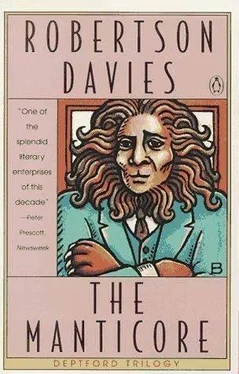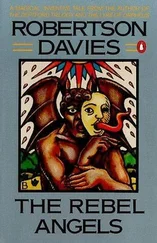Robertson Davies - The Manticore
Здесь есть возможность читать онлайн «Robertson Davies - The Manticore» весь текст электронной книги совершенно бесплатно (целиком полную версию без сокращений). В некоторых случаях можно слушать аудио, скачать через торрент в формате fb2 и присутствует краткое содержание. Жанр: Триллер, на английском языке. Описание произведения, (предисловие) а так же отзывы посетителей доступны на портале библиотеки ЛибКат.
- Название:The Manticore
- Автор:
- Жанр:
- Год:неизвестен
- ISBN:нет данных
- Рейтинг книги:3 / 5. Голосов: 1
-
Избранное:Добавить в избранное
- Отзывы:
-
Ваша оценка:
- 60
- 1
- 2
- 3
- 4
- 5
The Manticore: краткое содержание, описание и аннотация
Предлагаем к чтению аннотацию, описание, краткое содержание или предисловие (зависит от того, что написал сам автор книги «The Manticore»). Если вы не нашли необходимую информацию о книге — напишите в комментариях, мы постараемся отыскать её.
The Manticore — читать онлайн бесплатно полную книгу (весь текст) целиком
Ниже представлен текст книги, разбитый по страницам. Система сохранения места последней прочитанной страницы, позволяет с удобством читать онлайн бесплатно книгу «The Manticore», без необходимости каждый раз заново искать на чём Вы остановились. Поставьте закладку, и сможете в любой момент перейти на страницу, на которой закончили чтение.
Интервал:
Закладка:
"I know. You think the law has eaten me up. But I have lived by reason, and this is unreason."
"I think nothing of the kind. I think you do not understand the law. So far as we can discover, anything like a man that has inhabited this earth lived by some kind of law, however crude. Primitives have law of extraordinary complexity. How did they get it? If they worked it out as a way of living tribally, it must once have been fantasy. If they simply knew what to do from the beginning, it must have been instinct, like the nest-building instinct of birds."
"Very well; if I accept that the lion represents my somewhat undeveloped feeling, what about it?"
"Not a lion; a manticore. Do not forget that stinging tail. The undeveloped feelings are touchy – very defensive. The manticore can be extremely dangerous. Sometimes he is even described as hurling darts from his tail, as people once thought the porcupine did. Not a bad picture of you in court, would you say? Head of a man, brave and dangerous as a lion, capable of wounding with barbs? But not a whole man, or a whole lion, or a merely barbed opponent. A manticore. The Unconscious chooses its symbolism with breath-taking artistic virtuosity."
"All right. Suppose I am the manticore. Why shouldn't you be the sibyl?"
"Because we have come to a part of our work together where a woman, or a variety of women, are very likely to appear in your dreams in just some such special relationship to you as this. Did you notice the chain?"
"I noticed everything, and I can call it up now. It was a handsome gold chain."
"Good. That is much better than if it had been an iron chain, or a chain with spikes. Now, what have we: an image that appears on the left-hand side, which means that it comes from the Unconscious -"
"I haven't completely swallowed the idea of the Unconscious, you know."
"Indeed I do know. 'Fanciful… fancy dress…' all these scornful words come up whenever we discuss it. But we are at a point where you are going to have to face it, because that is where that blue-mantled sibyl resides. She has emerged from the Unconscious and can be of great help to you, but if you banish her you might as well stop this work now and go home."
"I have never heard you so threatening before."
"There comes a time when one must be strong with rationalists, for they can reduce anything whatever to dust, if they happen not to like the look of it, or if it threatens their deep-buried negativism. I mean of course rationalists like you, who take some little provincial world of their own as the whole of the universe and the seat of all knowledge."
"Little, provincial world… I see. Well, what is the name of this lady I am compelled to meet?"
"Oho – irony! How well that must sound in court? The lady's name is Anima."
"Latin for Soul. I gave up the idea of a soul many years ago. Well?"
"She is one of the figures in your psychological make-up, like the Shadow and the Friend, whom you have met and about whom you entertain few doubts. She is not a soul as Christianity conceives it. She is the feminine part of your nature: she is all that you are able to see, and experience, in woman: she is not your mother, or any single one of the women you have loved, but you have seen all of them – at least in part – in terms of her. If you love a woman you project this image upon her, at least at the beginning, and if you hate a woman it is again the Anima at work, because she has a very disagreeable side which is not at all like the smiling sibyl in the blue mantle. She has given rise to some of the world's greatest art and poetry. She is Cleopatra, the enchantress, and she is Faithful Griselda, the patient, enduring woman; she is Beatrice, who glorifies the life of Dante, and she is Nimue, who imprisons Merlin in a thorn-bush. She is the Maiden who is wooed, the Wife who bears the sons, and she is the Hag who lays out her man for his last rest. She is an angel, and she may also be a witch. She is Woman as she appears to every man, and to every man she appears somewhat differently, though essentially the same."
"Quite a nicely practised speech. But what do women do about this fabulous creature?"
"Oh, women have their own deep-lying image of Man, the Lover, the Warrior, the Wizard, and the Child – which may be either the child of a few months who is utterly dependent, or the child of ninety years who is utterly dependent. Men often find it very hard to carry the projection of the Warrior or the Wizard that is put upon them by some woman they may not greatly like. And of course women have to bear the projection of the Anima, and although all women like it to some degree, only rather immature women like that and nothing else."
"Very well. If the Anima is my essential image, or pattern of woman, why does she look like you? Isn't this proof that I love you?"
"No indeed; the Anima must look like somebody. You spoke of dreadful hags who assailed you in sexual dreams when you were a boy. They were the Anima, too. Because your sister and Netty could see you were in love, which I expect was pretty obvious, you projected witchlike aspects of the Anima on their perfectly ordinary heads. But you can never see the Anima pure and simple, because she has no such existence; you will always see her in terms of something or somebody else. Just at present, you see her as me."
"I am not convinced."
"Then think about it. You are good at thinking. Didn't you dislike me when the Shadow was being slowly brought to your notice; do you suppose I didn't see your considering looks as you eyed my rather perfunctory attempts at fashionable dress; do you suppose I was unaware of the criticism and often the contempt in your voice? Don't look alarmed or ashamed. It is part of my professional duty to assume these roles; the treatment would be ineffective without these projections, and I am the one who is nearest and best equipped to carry them. And then when we changed to the Friend, I know very well that my features began to have a look, in your eyes, of Felix's charming bear-expression of puzzled goodwill. And now we have reached the Anima, and I am she; I am as satisfactory casting for the role as I was for the Shadow or the Friend. But I must assure you that there is nothing personal about it.
"And now our hour is finished. We shall go on next day talking more about Judy Wolff. I trust it will be delightful."
"Well. Dr. von Haller, I am sorry to inform you, sibyl though you seem to be, that you are about to be disappointed."
9
The autumn that followed the war was wonderful. The world seemed to breathe again, and all sorts of things that had been taut were unfolding. Women's clothes, which had been so skimped during the war, changed to an altogether more pleasing style. When Judy was not in the Bishop Cairncross uniform she was marvellous in pretty blouses and flaring skirts; it was almost the last time that women were allowed by their epicene masters of fashion to wear anything that was unashamedly flattering. I was happy, for I was on top of my world: I had Judy, I was in my last year at Colborne College, and I was a prefect.
How can I describe my relationship with Judy without looking a fool or a child? Things have changed so startlingly in recent years that the idealism with which I surrounded everything about her would seem absurd to a boy and girl of seventeen now. Or would it? I can't tell. But now, when I see girls who have not yet attained their full growth storming the legislatures for abortion on demand, and adolescents pressing their right to freedom to have intercourse whenever and however they please, and read books advising women that anal intercourse is a jolly lark (provided both partners are "squeaky clean"), I wonder what has happened to the Davids and Judys and if the type is extinct? I think not; it is merely waiting for another age, different from our supernal autumn but also different from this one. And, as I look back, I do not really wish we had greater freedom than was ours; greater freedom is only another kind of servitude. Physical fulfilment satisfies appetite, but does it sharpen perception? What we had of sex was limited; what we had of love seems, in my recollection, to have been illimitable. Judy was certainly kept on a short string, but the free-ranging creature is not always the best of the breed.
Читать дальшеИнтервал:
Закладка:
Похожие книги на «The Manticore»
Представляем Вашему вниманию похожие книги на «The Manticore» списком для выбора. Мы отобрали схожую по названию и смыслу литературу в надежде предоставить читателям больше вариантов отыскать новые, интересные, ещё непрочитанные произведения.
Обсуждение, отзывы о книге «The Manticore» и просто собственные мнения читателей. Оставьте ваши комментарии, напишите, что Вы думаете о произведении, его смысле или главных героях. Укажите что конкретно понравилось, а что нет, и почему Вы так считаете.












